Night Time Toilet Training Tips
Knowing when to start night time toilet training is key.
Complete day time training first – don’t try to do both at once. The average age to start night time toilet training is around 4–5 years old. Boys can be a bit slower than girls.
They are either physically capable of holding on till the morning or they aren’t. If your child is consistently waking up wet, he is not ready.
Every child is different. Most children under the age of 5 still wet in their sleep, as do one in 10 younger primary school children.
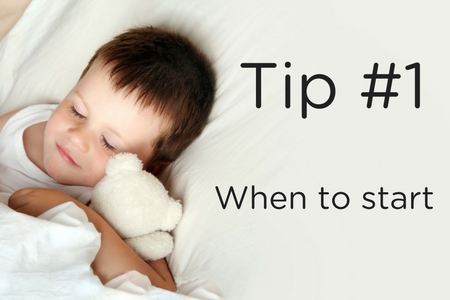
Ready, steady, go… Look for the signs your child is ready for dry nights.
There are definite signs of readiness you should look for before starting. Don’t rely exclusively on these – they are an indication the time may be right.
- Dry nappy in the morning
- If they are waking up wet, check to see if they are weeing just before they wake (look for a soaked warm nappy).
- Not wanting the nappy on at night – child led
- Waking up to go at night – either dry or wet.
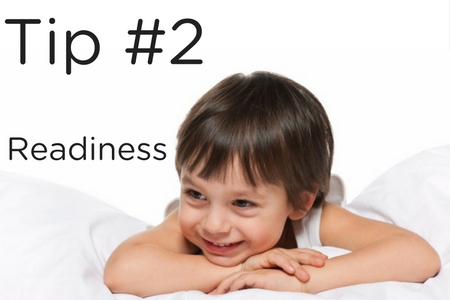
Go easy on yourself, time your night time training right.
Don’t start just before you go on holiday or just before you come home with a new baby.
You may be lucky and have a very quick training time frame. Or you are much more likely to be like the majority of us where it will take weeks/months to get completely dry.
You will have broken sleep changing a wet bed and child. Start when the time is good for you and your child.

Stick to a night time routine to help with toilet training.
Set a routine bedtime for your child. Over tired children fall deeply asleep and have a harder time waking up to go to the bathroom.
You may find you have a relapse over the holidays or when away as days tend to be fuller and the routine changes.

The house can be a scary place at night when you’re little.
A night light can make a huge difference. Your child needs to feel safe getting up in the middle of the night if they need to. You can also leave the toilet light on to make the house not so scary in the dark.

Prepare for a downpour when you start night time toilet training.
Don’t use disposable night time pants. Your child needs to feel wet for their brain to get the message they don’t like being cold and wet.
Prepare the bed and your child. Get a Brolly Sheet. Our bed pads with tuck in wings make it easy to change a wet bed at 2 am.
Explain to your child that Brolly Sheets are made to be weed on. It is no big deal if they have an accident.
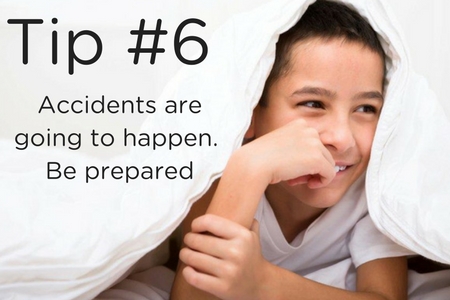
Praise and reward your child for staying dry or getting up to toilet. A reward chart may be handy to tick off going to the toilet before bed or stopping drinks at dinner time. Remember – bed wetting isn’t something in their control – so have a think about what to reward.

Give your child plenty of fluid during the day. If they drink plenty during the day, they shouldn’t need extra drinks after dinner.
Avoid caffeinated drinks like tea, chocolate and fizzy drinks before bedtime.

Manage your expectations to
avoid disappointment.

If your child is becoming anxious or frustrated, take the pressure off. Forget about night-time toilet training for a while. There is no shame in doing a restart in a few months’ time.

Teaching your child to change his/her own sheets after an accident helps them take responsibility. This is down to you and your child – you know them best.
Some kids like the fact they can change themselves and their bed and not wake up Mum.
A Brolly Sheet makes it easy for them to change themselves as it is a simple pull off and add a new one.

Try a bedwetting alarm. This is a small battery-powered device which contains a moisture sensor. When the child starts to wee, a signal is sent to a control panel and the alarm sounds (and/or vibrates) to wake the child.
Alarms are effective in about 90% of cases. The key is patience; the system can take up to 12 weeks to make a difference and you will still need to get up – but they really do work.
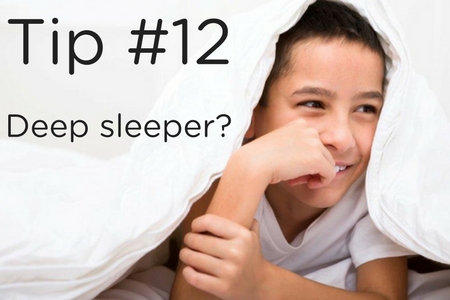
Remember that it might take years for your child to reliably master night-time dryness.
Don’t stress about it or compare your child’s efforts with other children who are apparently dry at night.
Bed wetting is nothing to do with your parenting skills or your child’s intelligence. Some kids just take longer.

Bladder training during the day helps to stretch the bladder so it can hold more at night.
Because some bedwetting cases are due to a small or immature bladder, some experts suggest encouraging the child to increase the time between weeing during the day will help with night time dryness.
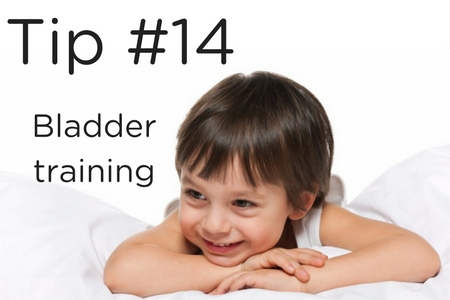
Communicate with and educate your child. With my 61/2 year old we talked about her bladder and how it was like a plastic bag in her body that stored her wee.
When she went to the toilet she had to imagine squeezing all the wee out of the bag so it was empty.
Tell your child it may take weeks or months so you set their expectations.

Make an appointment with your doctor to check that there is no urine infection (UTI) or constipation – recommended if your child is over 7 years.
Ask your doctor for a referral to a bed wetting clinic for an assessment and help to resolve the problem.

The idea behind waking your child is to train his unconscious mind to recognize the feeling of "having to go". That recognition may help clamp down on the sphincter muscle.
If a child is sleeping too deeply to self-wake to go to the bathroom, you will need to wake him up. Over 10 to 12 weeks, there will be a gradual reduction in the amount of fluid released.
The child will still wet the bed throughout training but gradually he may start to use his sphincter muscles before completely letting go of the bladder until he finally reaches the point of control.
Some parents recommend waking the child for a visit to the toilet about two hours after they’ve gone to sleep. If the sheet is already wet, wake them a half hour earlier the next night. Keep reducing the time until you catch the first wee.

Changes in the daily routine or an increase in activities could also contribute to your child’s night wetting.
If he is getting overtired from school and extramural activities then he’ll no doubt sleep like a log and not being able to rouse himself to respond to his full bladder and go to the toilet.
Make sure that if your child is super tired that you have reminded him to go to the toilet before going to bed.
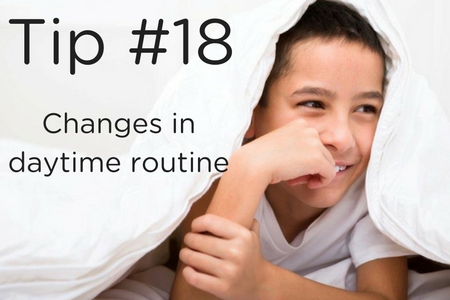
Bed wetting is hereditary in many cases. If you or your partner wet the bed till a later age, then it is much more likely your child will.
